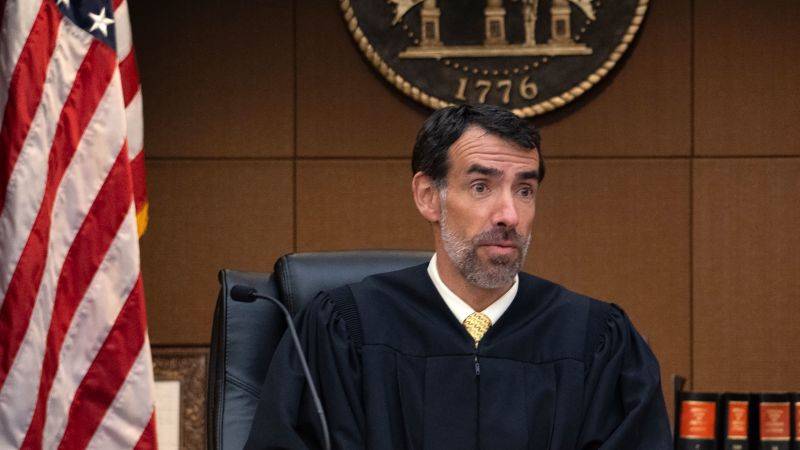A Georgia judge signaled Tuesday that he sees a need to bring clarity to the meaning of a “vague” new election certification rule approved by Donald Trump allies that critics say will inject chaos into the battleground state after Election Day.
State and national Democrats have sued the GOP-controlled Georgia State Election Board over a pair of rules passed in August that require county election officials to conduct a “reasonable inquiry” into election results before certifying them and allow them to “examine all election related documentation created during the conduct of elections prior to certification of results.”
During a bench trial in the case on Tuesday, Fulton County Superior Court Judge Robert McBurney said the “reasonable inquiry” rule “on its face is vague and needs clarification.”
At several other points during the trial, McBurney also raised concerns about the election board changing election rules so close to this year’s contest, saying that “new rules seem to pop up every 20 minutes.”
“And the election is getting closer, not further away,” the judge said, pushing back on an argument from Republicans that intervened in the case to defend the new rules that his hands are tied by a judicial principle established in a 2006 Supreme Court case, Purcell v. Gonzalez.
The high court said in its decision in that case that federal courts should not change rules “on the eve of an election.” But, the judge said, that puts court in a difficult situation if the rules shouldn’t have been approved in the first place.
“That would mean that there is a window where unreviewable rules can be issued,” McBurney said. “They can be procedurally defective. They can be substantively defective. They can be unconstitutional and they’re incapable of review because this agency, this rulemaking body, says, ‘Oh, we’re within the Purcell window, now’s the perfect time to say let’s count ballots by hand and we know a court can’t look at that new rule because it’s too close to the election.’”
Last month, three Trump allies on the board approved a rule that requires counties to hand-count the number of ballots cast at polling places on Election Day. Democrats sued to block that new rule on Monday.
But as McBurney on Tuesday seemed to agree that clarity needed to be brought to the “reasonable inquiry” rule passed by the board in August, he threw cold water on Democrats’ argument that the “examination rule” will disrupt the certification process, which must be completed this year by November 12.
“That seems to be a permissive rule, and I struggle to see how that presents uncertainty to anyone because it permits access but doesn’t obligate anyone to do anything. It says you may, but not that you must,” McBurney said of the examination rule.
At the start of Tuesday’s trial, attorneys for all sides agreed that certification must be completed by 5:00 p.m. on November 12, as state law requires. But Democrats are still arguing that a ruling still needs to guard against county election officials who may refuse to certify the election results under the new rules.
The case is among the most closely watched pre-election disputes, with Democrats warning that if the rules are allowed to stand, they’ll unleash “chaos” throughout the critical battleground state in the days following the election, when county election officials face a short window of time to certify the results of the presidential contest.
The judge’s decision is not expected to be the final say in the matter, as both sides are likely to appeal any adverse ruling against them.
Trump and his allies unsuccessfully tried to overturn the results of Georgia’s 2020 election, and the lawsuit, which is backed by Vice President Kamala Harris’ campaign, underscores renewed fears from Democrats that his supporters might try to subvert this year’s result should he lose the state again.
At the center of the case are claims by the Democratic National Committee, the Democratic Party of Georgia and several others that the new rules conflict with state law that says local officials have a mandatory duty to certify election results by November 12. The new rules, they argue, undermine that duty by giving those officials broad authority to delay or decline altogether their certification of the results “in a hunt for purported election irregularities.”
The Democrats say that the State Elections Board exceeded its authority when it took the job of handling allegations of “fraud or election misconduct” out of state courts and put it in the hands of local partisan officials.
“County-level discretion over certification is not needed to address misconduct, fraud, or error; an expedited, orderly, and evidence-based judicial process exists to do so instead,” attorneys for the rule’s challengers wrote in court papers.
The plaintiffs are asking McBurney to “confirm that the duty of county superintendents to certify election results by the statutory deadline is mandatory” and to invalidate the new rules should he find that state law leaves no room to “withhold or delay certification.”
The attorneys also argued that the Democrats’ concerns are over potential “future contingencies” that don’t meet the legal threshold required to bring the lawsuit in the first place. The Republican National Committee and state GOP party, which both intervened in the case to defend the rules, are similarly arguing that there is no live controversy for the court to resolve.






